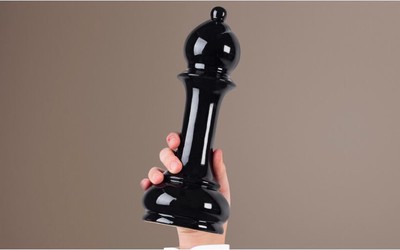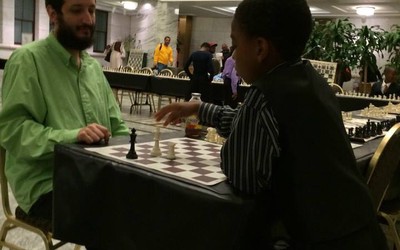
Doing puzzles
Do they improve your tactics?Weaker players such as myself are weak primarily because we're not very good at tactics. We blunder material or fail to notice when our opponent does, and that's usually the reason we lose. It's difficult to improve overall strength without getting better at tactics, and consequently we do a lot of puzzles trying to raise our tactical ability. I don't agree with Lawrence Trent, who was quoted as saying that you should just practice tactics until you get to a 2200 rating, but they're certainly very important and probably the number one factor in overall strength. Most of us have had the experience of losing a game (or games) to an opponent who apparently knows nothing about how to play chess, makes the most anti-positional moves possible and avoids trades that he should obviously make, yet never loses material and eventually wins in a lost position because we allow him to win a bishop with a three-move tactic.
We do puzzles to try to avoid being on the wrong end of that situation. I've practiced tactics ever since I started playing chess, but I got a little more systematic about it over the last few years by doing the exercises daily as opposed to whenever I felt like it. I still probably don't do enough, but I don't have the same single-minded doggedness of someone like Neal Bruce, who over a period of years created thousands of flash cards that he went over for an hour every single day until suddenly he just got good. I could spend an hour doing tactics but certainly not every day, and I'm too lazy to create the flash cards so I do online tactics puzzles instead. Nevertheless, I think there's a lot of value in making tactics practice a regular part of my daily routine. Would it be better if I spent a whole hour every day? In one sense yes, but on the other hand it would be so joyless that I would probably just stop playing altogether. My current regimen strikes a balance between effectiveness and fun.
There are a number of problems with trying to improve your tactics with puzzles. By their nature, puzzles generally have one correct solution, and that solution almost always involves winning material or checkmate. In a real game nothing alerts you to the fact that a winning move is possible. In a puzzle, if you fail to find the winning move the move you choose might just have a neutral result--you had a winning move but missed it and the position is equal--or it could be a blunder that loses instantly, but both would score equally wrong in the context of the puzzle. In real games half of your time--maybe more--is spent not looking for material-winning tactics for yourself but making sure your candidate moves don't give your opponent a tactic against you.
Puzzles don't perfectly replicate game conditions, but there's not much you can do about that. When it comes to learning tactics volume is important and puzzles are about the only way you can train yourself to notice things before they happen. If you've done 500 puzzles where the key idea was exploiting the opponent's weak back rank, you're more likely to notice an opponent's weak back rank in a game than if you've done 50 such puzzles, or zero. And those 500 puzzles will help you also recognize when your own back rank is weak too, though perhaps not as well. It's still better to see the opponent's weak back rank problem 500 times than see your own back rank problem 50 times.
There are certain types of puzzles that I'm not talking about in this blog entry. One is endgame studies and another is composed problems where the position is intentionally strange and the correct answer often counterintuitive. Those are interesting types of puzzles but they aren't particularly good for improving tactical ability.
Leaving those aside, there are two basic types of tactics puzzles: easy and difficult. It's important to practice both. Easy puzzles, if online, are generally timed and you're supposed to get most of them correct. The challenge is to recognize the tactical pattern and find the answer relatively quickly. You can progress through these puzzles fairly quickly and the idea is that as you see the same patterns again and again eventually you recognize the answer almost instantly any time that pattern comes up. Difficult puzzles, by contrast, are generally untimed and they're supposed to be challenging, often with several tempting potential solutions that are incorrect. They require careful, accurate analysis to get right, so they test your ability to analyze and calculate. Between the two types of puzzles you seek to improve both your pattern recognition and analysis, the two big components of tactical ability.
I practice "easy" puzzles every day, and my main problem isn't getting the wrong answer but not finding the right answer fast enough. If you've read many of my previous blog entries this probably doesn't surprise you. I do my work on Chesstempo, which tracks your puzzle performance with a rating. If you get a puzzle correct within a certain time limit you gain a few points; if you submit an incorrect answer you lose more points; if you get the right answer but too slowly you lose fewer points. As your rating increases, you get more difficult problems and are expected to answer more quickly, and the opposite occurs if your rating decreases. With the system being set up this way, I get the correct answer about 85% of the time but my rating hovers within a fairly narrow range because I lose points almost as often as I gain them on correct answers.
I do "difficult" puzzles on Lichess. They weren't difficult when I started, but Lichess puzzles are untimed so I've been able to solve many difficult problems simply by taking an unreasonable amount of time analyzing them, and consequently my Lichess puzzle rating has climbed high enough where every puzzle I get is very challenging. I now look at every Lichess puzzle as a series of 2-4 "only move" problems, all of which I must answer correctly to get the puzzle correct. It's very satisfying when I'm able to do it and it's usually only possible because I take so much time, much more than I would have available in a real game even at a slow time control.
How much has all of this puzzle solving helped my overall game? It's difficult to say. My puzzle ratings haven't improved much for several years and neither have my game ratings, but the real question is whether my game ratings would be as high as they are if I didn't do puzzles at all. I think the answer is no, but I have no way of proving this. The daily tactics work definitely helps keep me sharper and minimizes the instances where I sit down to play and just don't notice obvious tactical features of the position (which, unfortunately, still does happen sometimes).
Maybe Lawrence Trent is right and I should just forget about all this other nonsense about openings and positional play, or for that matter playing games of chess, and instead should just do tactics puzzles until my tactics are as good as a 2200 player. Or at least be more like Neal Bruce and do tactics for an hour every single day for a couple of years until I have a better handle on tactics and then move on to some other aspect of the game. I would if I could, but that's beyond my ability to endure. I want to improve at chess, but I want it to be fun too, and an hour of tactics every day isn't my idea of a fun hobby. I'll stick with what I'm doing and occasionally I'll do that whole hour of tactics. Just not every day.



